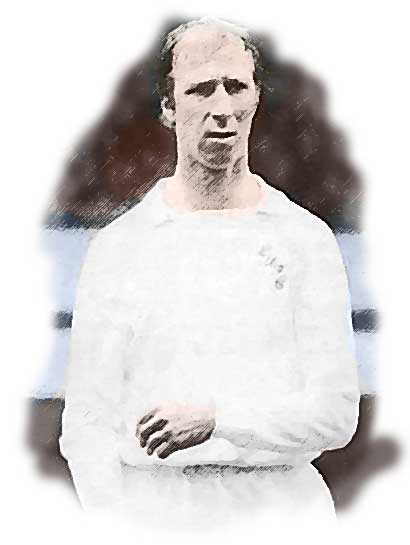 Part
2 1966 and all that - Part 3 Indian Summer:
Final Years with Leeds - Part 4 Football Manager
- Part 5 The Irish Saviour
Part
2 1966 and all that - Part 3 Indian Summer:
Final Years with Leeds - Part 4 Football Manager
- Part 5 The Irish Saviour
Jack Charlton had a remarkable career in football. He was not a gifted
player, like his kid brother Bobby, and constantly had to live in his
shadow. However, that did not prevent him from rising to the very summit
of his profession, first as a no-nonsense, old fashioned stopper and then
as a successful manager at both club and international level.
He played 35 times for England between 1965 and 1970. He was on the losing
side just twice, and the team conceded a miserly 21 goals. He helped his
country win the World Cup in 1966.
He spent all his playing career from 1952 to 1973 with Leeds United,
appearing in 629 league games. He won a league championship, a Second
Division Championship, the FA and League Cups, two Fairs Cups and umpteen
runners-up medals. He was Footballer of the Year in 1967.
As a club manager, he rescued Middlesbrough from the doldrums and turned
them into one of the most convincing Second Division champions of all
time, winning the Manager of the Year trophy in the process in 1974 and
then establishing them in the First Division.
As an international manager with the Republic of Ireland, he welded a
shoddy collection of individuals into a team who could compete on even
terms with the world's best for several years.
Jack Charlton, OBE, Freeman of the City of Dublin and now Honorary Irish
citizen, is an authentic footballing hero. Big Jack, The Boss - a man
who specialised in the improbable.
He was born on 8 May, 1935 in the Northumberland village of Ashington,
18 miles north of Newcastle, to a large family with significant footballing
traditions. As well as the younger brother who followed him, Jack was
also cousin to Newcastle centre forward 'Wor' Jackie Milburn and his other
uncles Jack, George, Jimmy (all Leeds) and Stan (Chesterfield, Leicester)
played professionally in the top two divisions.
Jack, however, seemed destined to follow many North Easterners down the
local pit, but he didn't like it, resigned and applied to be a police
cadet.
However, in 1950, aged just 15, a Leeds scout asked him to go for a trial
and he played against Newcastle's youth team rather than attending his
interview with the police. Charlton was duly taken onto the Elland Road
ground staff. Among the players there when he arrived was his uncle, Jim
Milburn, but the star of the show was undoubtedly John
Charles.
Charlton: 'The rules stipulated that clubs had to retain or release ground
staff by their seventeenth birthday. And at noon on 8 May 1952, I presented
myself at the office of the club secretary, Arthur Crowther, to await
the fateful decision. The manager was away on tour with the senior team
in Holland, and it was Arthur's job to deliver the verdict. At that point,
I honestly had no idea what to expect. Nobody had ever said to me that
I had a future in the game, least of all Major
Buckley.
'So when I walked into Arthur's office, I could not guess what lay ahead.
He got straight to the point. "Jack," he said, "'The boss
has instructed me to offer you a contract. You'll have ten pounds signing
on fee, eighteen pounds a week in season and fourteen pounds off."
The first thought that entered my mind was, "That's senior team money!"
'I left that office feeling ten feet tall. When I walked across the road
to a newsagent's shop directly opposite the ground, the guy behind the
counter asked, "Have you signed then, Jack?" And when I told
him I had, he said, "Thank God for that! I've had half the scouts
in the Football League in here this morning, wanting to know what you
were doing."
'I asked how many. "There must have been a dozen of the buggers,
all wanting a word," he told me. I was stunned. And in that moment,
for the very first time in my seventeen years, I realised that I might
have a real future in the game.' Charlton's first season as a pro was
uneventful, and he spent most of it in the second team, although he did
get dropped down to the thirds for a while. Then, towards the end of 1952/53,
the breakthrough came.
back to top
Charlton: 'On Friday, 24 April 1953, I got the biggest surprise of my
life. No sign of my name on the thirds or on the reserve team - but bloody
hell, there it was,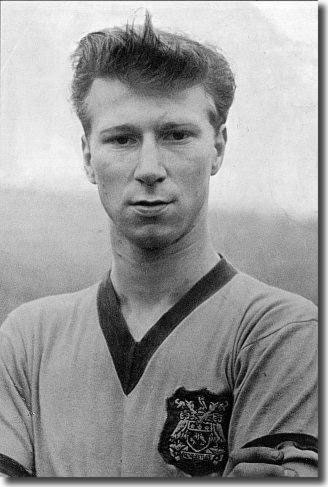 "J Charlton" in the first-team to play Doncaster Rovers the
following day! When I looked at the team sheet on the door, I discovered
that John Charles had been moved up to centre-forward, and I was taking
his place at centre-half. Talk about going in at the deep end!'
"J Charlton" in the first-team to play Doncaster Rovers the
following day! When I looked at the team sheet on the door, I discovered
that John Charles had been moved up to centre-forward, and I was taking
his place at centre-half. Talk about going in at the deep end!'
Charlton did okay as Leeds drew the last match of the season 1-1, but
then had to go off for two years national service, based mainly in Windsor,
and the two years down South made a big difference to the teenager.
'I came back to Leeds two years older and much more self-assured. You
could say that I went away to the army a boy of eighteen, and came back
a man of twenty. After what I'd experienced away from the club, I wasn't
in any mood to let myself be pushed around. Maybe I was a bit too full
of myself. I remember one run-in I had with John Charles, of all people,
when he came back for a corner against us and started telling me where
to go. I soon told him where to go, in a way that he couldn't have misunderstood.
'After the game he put me up against the wall and pointed a finger at
me. "Don't ever speak to me like that again!" he said.'
However, Charlton was making progress and came back into the first team
for a home game against Rotherham on 24 September 1955. He didn't miss
another game that season, with Charles again moving to centre-forward.
'It was a wonderful season for Leeds
United. We'd been not far off the pace in the Second Division for several
years without managing to win promotion, in spite of all the goals that
John Charles kept scoring. The trouble was, as fast as he scored them,
the Leeds defence had been letting them in at the other end. Now, we established
a home record of 34 games without defeat, finishing second to Sheffield
Wednesday and winning promotion to the First Division for the first time
since 1947.'
Charles was an excellent role model for the young Charlton, as he had
first made his name as a centre half, although he was a revelation when
he moved up front, hitting a club record 42 goals in 1953/54.
He also proved a willing teacher and coached the youngster, teaching him
all the tricks of the trade and finding him a very willing pupil.
However, the relationship was ended when Charles moved to Italian giants
Juventus for a world record £65,000 fee at the end of the 1956-57
season. Charlton was going through a difficult time in his career at that
stage, staying out late, boozing and womanising, and getting dropped for
much of the second half of the season. He played just 21 games in the
league.
Shortly after he met his wife to be, Pat Kemp, at a dance and they quickly
married, on 6 January 1958. The relationship had a major impact on Charlton
and he regained his place in the Leeds side, playing 40 games in 1957/58,
with his form good enough to see him in (and scoring for) the Football
League team which beat the League of Ireland in October 1957.
The team's dependency on Charles became clear in the two years following
his departure as the goals for totals shrunk. Raich
Carter's contract was not renewed, and he was replaced by his coach
Bill Lambton who faced unrest from
the players. Lambton's main contribution to the club was the setting up
of a youth policy that soon turned up Billy Bremner and then delivered
other famous names.
Less than a year later, Lambton was on his way, handing over to Jack
Taylor, who saw the club relegated at the end of the 1959/60
season. Taylor resigned in March 1961 with the club firmly in the bottom
half of Division Two.
The directors appointed Don Revie
as player-manager in March 1961 - a move which was ultimately to change
the entire course of Leeds United's history as well as 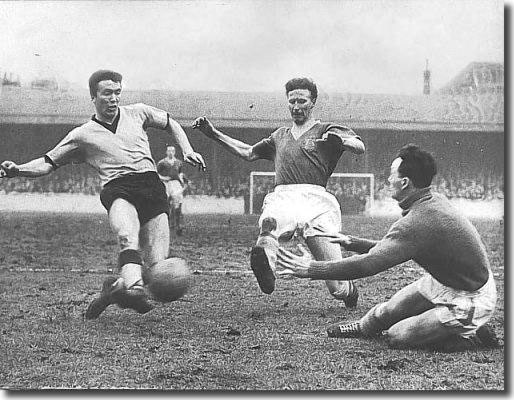 Jack
Charlton's career.
Jack
Charlton's career.
While all this was going on, Jack was training for his FA coaching badge.
His success in this field only served to increase the frustration he was
starting to feel more and more keenly at Elland Road at what he perceived
as a lack of professionalism. He was also still fighting against the establishment
and proving notoriously difficult to manage.
back to top
'I suppose I was feeling rather sorry for myself at the time. It irritated
me when Don Revie said that I was spoiling it for the others, "with
that chip on your shoulder". Maybe I had a bit of a chip. Maybe I
just needed some discipline, I don't know. I remember what Don told me
during one practice match. I used to go charging up the field for corner
kicks and I ran about all over the park during the play. The crowd liked
it when I ran with the ball, although half the time - no, 90 per cent
of the time - I'd overrun the bloody thing. Totally unprofessional. Anyway,
I'd gone charging up the field with the ball and Don said to me afterwards,
"If I was manager, I wouldn't play you - you're always messing about."
'"Well, you're not the manager," I said, "so what the
hell?" And then, lo and behold, Don became manager! I was, well ...
I couldn't have been one of Don's favourites in those early days.
'The first year with Revie was an interesting one. The day after he took
over, he moved me up to centre forward. I tried my best, but the No 9
shirt didn't feel right to me. I didn't know what to do, and nobody showed
me. I remember Joe Shaw of Sheffield United laughing at me, I was making
such a mess of it. After I protested Don switched me back to centre-half.'
Altogether Jack played 21 league games for the club as No 9 in this period
and hit 12 goals in those matches, but he never felt comfortable there.
Charlton had run ins with all the backroom staff, including assistant
manager Syd Owen and trainer Les Cocker. Revie despaired of him at times,
but persisted with his attempts to convert him into a forward, buying
Freddie Goodwin from Manchester United to take his place at the back.
'We had a bloody awful spell and went very quickly down the league. At
the end of the season we finished nineteenth, and only just avoided
relegation to the Third Division by winning the last game against Newcastle
3-0.
'Revie called me into his office one day and announced, "I'm prepared
to let you go." I said, "Wait a minute, are you letting me go
as a centre-forward or a centre'half, 'cos I've been playing for you for
fifteen games or whatever as centre-forward, which is not my position?
But I've been doing it because you asked me - when really I should be
coming back to my own position if I'm in the side."
'I started playing for the reserves. The funny thing was that though
Don had said that he was prepared to let me go, he never did put me on
the transfer list.
'Bill Shankly telephoned me to say that he was negotiating with Leeds
to buy me for Liverpool. "I have offered them £28,500 and they want
£30,000." he said. "I'm not going to be held to ransom - so
the deal's off, for the time being. I'm sorry, son, but that's the way
it is."
'I'd been told that Manchester United were interested in signing me,
too. They were on a tour of America at the time, but it seemed they were
going to come in for me at the end of the summer. So I refused to sign
a new contract with Leeds. It caused an unpleasant feeling at the club.
Syd Owen took me by the arm and asked me what the problem was, but I told
him to shove off. Then I got a message to go over to see Matt Busby. We
sat talking in his office, and he explained that while they were in America
they had played a young lad at centre-back, someone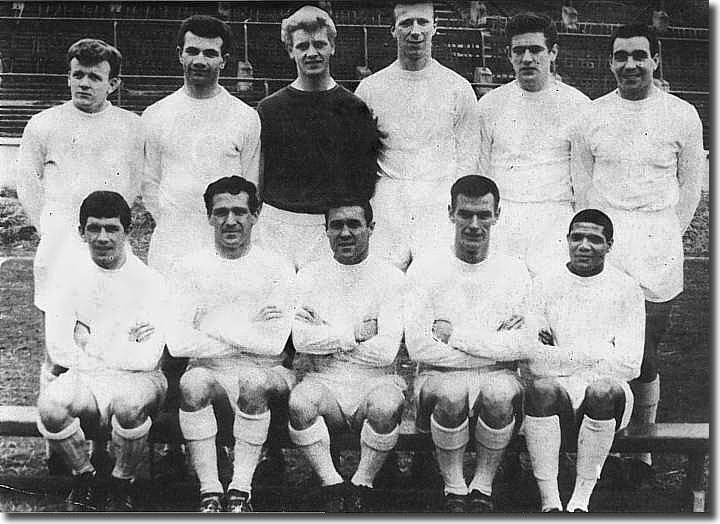 who had just come into the side, and Matt wanted to wait until the new
season started so that they could have a look at this lad before giving
me a decision.
who had just come into the side, and Matt wanted to wait until the new
season started so that they could have a look at this lad before giving
me a decision.
'I couldn't believe what he was telling me. "I have caused ructions
at Elland Road, I have refused to sign a contract, nobody there is speaking
to me," I said. "I have caused bloody havoc in the club, I have
been offered a deal and turned it down - and now you are telling me I
have got to wait until the beginning of the new season, until you have
had a look at someone else? No," I said, "I am not going to
do that, I am going back to Elland Road, and I am going to apologise for
what I have done. I am going to sign a new contract with the club and
I am not bloody well coming here!"
'I was most upset when I walked out of Busby's office. I went straight
back to Leeds to see Don. "Have you got a contract you want me to
sign?" I asked him. He said yes, he had. "I have caused you
enough problems at this club," I told him, "and I won't cause
you any more." And I signed.'
Charlton never looked back after that moment. Revie was convinced that
he could play for England and he told him so. He also made him his first
choice at the back and started to build his new Leeds team around him
and the young Scot Billy Bremner.
'There was a game against Swansea,
in September 1962, that marked a turning point in my life. Don had
left a lot of senior players out of the side, a very brave thing to do
at the time, and he brought in a lot new young players he'd just signed
- Gary Sprake in goal, Norman Hunter, Paul Reaney, and a fellow called
Rod Johnson. I said to Don, "Well. I'm
not going to play the way you've been playing with Fred, I don't want
to play man-to-man marking, I want to play a zonal system where you pick
up people in your area. I'll sort out the back four for you the way I
want them to play" - and Don said OK.
back to top
'That, for me, was the moment when I stopped being one of the awkward
squad and came on board the Leeds United ship. It was a sign that I would
be one of the key players in the new team Don was building. I was sort
of the organiser at the back, I was the pusher, I was the one who told
the young lads where to go, when to cover, and how to pick up positions.'
Charlton formed an impregnable partnership at the back with the youthful
Norman Hunter as Leeds first avoided relegation to the Third Division
in 1962, then climbed to fifth in 1963, before
securing the Second Division title in 1964. Jack had only missed 14
games in the previous 4 years, but in 1963/64 he had a lengthy lay-off
through injuries, from the beginning of November until he returned at
the end of February for the home game with Huddersfield. Jack played through
from then to the end of the season and despite the next game being a 2-0
defeat at Preston, Leeds won 8 times during a run of 12 matches, with
the Preston match being the only defeat.
The partnership formed with Hunter was a particularly effective one and
lasted well on into the 70's. Charlton was always very supportive of his
partner in crime: 'The centre-half is meant to win the ball and if he
starts giving fouls away around the penalty area he'll soon have the manager
on his back. Norman was a great tackler, but occasionally he would mistime
one. People laugh when I say that and think it's a joke, but nobody should
have picked on Norman. We were both Geordie lads and they always teach
you how to tackle right, up there. We were a good partnership. My strength
was in the 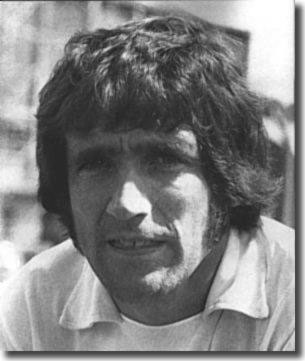 air
and Norman's was on the floor. We got on well enough and played for a
few years, and then he came to me one day and said "I'm sick of listening
to you telling me what to do all the bloody time.' I said, 'Good lad,
you'll be all right now, then."'
air
and Norman's was on the floor. We got on well enough and played for a
few years, and then he came to me one day and said "I'm sick of listening
to you telling me what to do all the bloody time.' I said, 'Good lad,
you'll be all right now, then."'
There were dire predictions of what life in the First Division would
be like for Leeds; their previous visits had been ignominious to say the
least and their style under Revie was not popular, but as it turned out
they took the division by storm.
'The 1964/65 season was marked
by an intense rivalry between ourselves and Manchester United. Both teams
seemed to have a chance of the double until very late in the season. We
went to the top of the First Division and enjoyed a run of twenty five
games without defeat before Manchester United beat us at Elland Road -
a defeat that eventually cost us the league championship.
'But we were league leaders right up to the last game, when we
played Birmingham City away. Manchester United were playing at home
that night. We knew we had to win, but in fact we went a goal behind after
only four minutes, and soon after half-time we conceded another two goals.
We fought our way back in the last fifteen minutes, and four minutes before
the end I scored the equaliser. But we couldn't get the win we needed.
I don't know whether it was nerves or not. Having to go to a place and
win your last match is a different thing entirely from going to a place
needing to draw. Being such a high-profile game probably helped them more
than it did us - they had a chance for glory in an otherwise lacklustre
season. If we'd played Birmingham earlier in the season we'd probably
have beaten them. But that game at Birmingham started the notion that
Leeds United choked under pressure.
'We ended up losing the league on goal difference. Even though we'd won
a massive sixty one points, enough to win the championship in most seasons,
we hadn't clinched it.
'We had a chance for revenge against Manchester United when we were drawn
against them in the semi-finals of the FA Cup. The
first semi-final, at Hillsborough, was a bad-tempered game which ended
in a 0-0 draw. I had a number of clashes in the penalty area with Denis
Law, nearly pulling the shirt off his back on more than one occasion.
You had to hang on to Denis, because he was so sharp and so good in the
air. I used to hate playing against him, though I've always regarded him
as a good pal of mine.
'We won the semi-final replay 1-0,
after a goal by Billy Bremner only two minutes from the end.'
Leeds froze in their first Wembley
Final, against Liverpool, and never hit real form, even though they
got through to 90 minutes with a 0-0 scoreline. Roger Hunt put Liverpool
in front after three minutes of extra-time. This setback would have finished
most sides, especially in the heavy rain and on the energy sapping Wembley
turf, but not Don Revie's men. Charlton, stealing up into attack, nodded
down a Hunter lob, and there was the dynamic Bremner, still full of fire,
to hit an unstoppable volley for the equaliser. Liverpool were stunned,
but they too were fighters and with nine minutes left Ian St John met
a cross from Ian Callaghan with his head to flash it past Sprake. The
2-1 win was no more than the Merseyside team deserved on the day.
It was so near and yet so far for Leeds, who had come from nowhere to
be double runners up and amongst the most feared clubs in the country
and Big Jack was one of the cornerstones of the side. He played 39 games
in the league, scoring 9 times. His form had seen him break through into
the England reckoning before the end of that season. He made 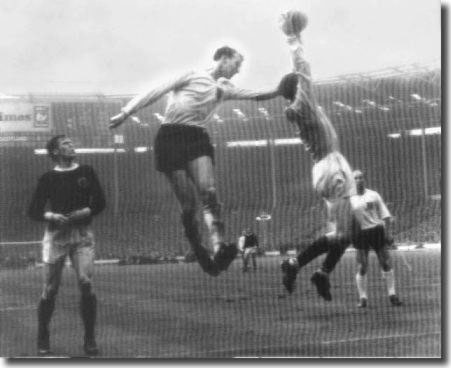 his
debut against Scotland at Wembley on 10 April 1965, just a few weeks short
of his thirtieth birthday. It was a fiercely fought contest, which a ten
man England were relieved to draw 2-2.
his
debut against Scotland at Wembley on 10 April 1965, just a few weeks short
of his thirtieth birthday. It was a fiercely fought contest, which a ten
man England were relieved to draw 2-2.
Jack retained his place for a 1-0 Wembley win over Hungary and then set
off with the side for a short European tour, playing in two of the three
games. He was now an England regular, playing many times through the 1965/66
season as the side prepared for the World Cup Finals. His form was good
as Leeds continued to make progress on the club front.
back to top
'We were again second in the league, this time to Liverpool. It was our
first season in Europe, since we'd qualified for the old Inter Cities
Fairs Cup. Bobby Collins broke his thigh
bone in the opening match in Turin. I remember it very vividly - Bobby
was lying there, the referee wanted to move him off the park, and the
Torino players were trying to bundle him off. I wouldn't let them move
him; I knew that if Bobby Collins wouldn't
get up, he must have something broken. I stood over him, whacking one
Italian and punching another to keep them back, until eventually the referee
realised that Bobby must be seriously hurt and called for a stretcher.
We won the game 1-0, but Bobby was never the same player for Leeds again.
'In the third round we were drawn against Valencia. The
first leg at Elland Road ended in a bit of a barney between myself
and their defender Vidagny. I'd come up for a corner kick, like I always
did at the time, and as the ball was cleared, he just kicked me across
the ankles. I stumbled and fell, and then I got up and went after him.
He ran towards the goal and hid behind the net, with three or four Spanish
players blocking my path. I was trying to get past them when the goalkeeper
punched me in the mouth, so I went after him instead. The keeper backed
away, kicking to keep me off - and then a policeman brought me down.
'The referee took us all off the park, and then he came into the dressing
room and told me that I would not be coming back when play resumed. Vidagny
didn't come back either.
'The press lads had a real go at us afterwards. There was an FA inquiry.
Don defended me, saying that I'd been provoked by being constantly kicked.
The referee, a Dutchman called Leo Horn, flew into London and gave evidence.
To his great credit, he took some of the blame. "I actually saw the
player kick Mr Charlton and I didn't do anything about it," he said.
"I maybe should have done something about the incident, but I turned
away as the game was still going on. Then I looked back and I saw that
Mr Charlton was chasing that man with madness in his eyes." The FA
fined me twenty pounds.'
The second leg in Spain was billed a potential blood bath, but it was
perfectly normal and Leeds progressed, eventually losing to Real Zaragoza
in a semi-final replay. Charlton scored the winner in the second leg and
Leeds' only goal in the replay.
Part 2 1966 and all that - Part
3 Indian Summer: Final Years with Leeds - Part
4 Football Manager - Part 5 The Irish Saviour











 Part
2 1966 and all that - Part 3 Indian Summer:
Final Years with Leeds - Part 4 Football Manager
- Part 5 The Irish Saviour
Part
2 1966 and all that - Part 3 Indian Summer:
Final Years with Leeds - Part 4 Football Manager
- Part 5 The Irish Saviour "J Charlton" in the first-team to play Doncaster Rovers the
following day! When I looked at the team sheet on the door, I discovered
that John Charles had been moved up to centre-forward, and I was taking
his place at centre-half. Talk about going in at the deep end!'
"J Charlton" in the first-team to play Doncaster Rovers the
following day! When I looked at the team sheet on the door, I discovered
that John Charles had been moved up to centre-forward, and I was taking
his place at centre-half. Talk about going in at the deep end!' Jack
Charlton's career.
Jack
Charlton's career. who had just come into the side, and Matt wanted to wait until the new
season started so that they could have a look at this lad before giving
me a decision.
who had just come into the side, and Matt wanted to wait until the new
season started so that they could have a look at this lad before giving
me a decision. air
and Norman's was on the floor. We got on well enough and played for a
few years, and then he came to me one day and said "I'm sick of listening
to you telling me what to do all the bloody time.' I said, 'Good lad,
you'll be all right now, then."'
air
and Norman's was on the floor. We got on well enough and played for a
few years, and then he came to me one day and said "I'm sick of listening
to you telling me what to do all the bloody time.' I said, 'Good lad,
you'll be all right now, then."' his
debut against Scotland at Wembley on 10 April 1965, just a few weeks short
of his thirtieth birthday. It was a fiercely fought contest, which a ten
man England were relieved to draw 2-2.
his
debut against Scotland at Wembley on 10 April 1965, just a few weeks short
of his thirtieth birthday. It was a fiercely fought contest, which a ten
man England were relieved to draw 2-2.